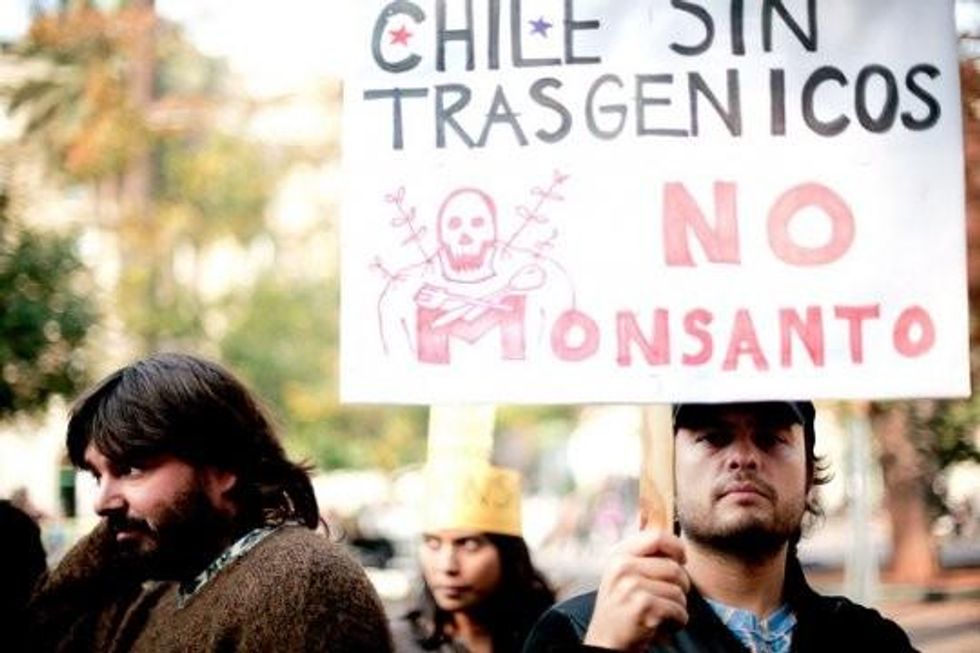

SUBSCRIBE TO OUR FREE NEWSLETTER
Daily news & progressive opinion—funded by the people, not the corporations—delivered straight to your inbox.
5
#000000
#FFFFFF
To donate by check, phone, or other method, see our More Ways to Give page.


Daily news & progressive opinion—funded by the people, not the corporations—delivered straight to your inbox.

The law, set into motion by former President Michelle Bachelet, is currently making its way through the parliament, and would give seed patenting rights to corporations such as Monsanto, the I Don't Want GMOs in Chile campaign (Yo No Quiero Transgenicos en Chile) explained.
Joel Gonzalez, a representative from the campaign, said that the measure was an attack "against agricultural practices of peasant communities" who weren't even consulted about the proposed law but could be slapped with fines from the corporations for violating the seed patents.
"This law puts seeds into the hands of a few transnational companies," added Ivan Santandreu, a member of Chile without GMOs (Chile Sin Transgenicos). "This measure does not contribute to the innovation and wellbeing of independent farmers at all. What it does is put food sovereignty at risk by making it dependent on big corporations," he told Radio Universidad de Chile.
TeleSur adds that critics say the law would prevent the saving of seeds and would increase the amount of time corporations have over the rights of hybrid and GMO seeds in the country.
Flickr user Deoxyt2 has photos from Saturday's march:
________________________
Dear Common Dreams reader, The U.S. is on a fast track to authoritarianism like nothing I've ever seen. Meanwhile, corporate news outlets are utterly capitulating to Trump, twisting their coverage to avoid drawing his ire while lining up to stuff cash in his pockets. That's why I believe that Common Dreams is doing the best and most consequential reporting that we've ever done. Our small but mighty team is a progressive reporting powerhouse, covering the news every day that the corporate media never will. Our mission has always been simple: To inform. To inspire. And to ignite change for the common good. Now here's the key piece that I want all our readers to understand: None of this would be possible without your financial support. That's not just some fundraising cliche. It's the absolute and literal truth. We don't accept corporate advertising and never will. We don't have a paywall because we don't think people should be blocked from critical news based on their ability to pay. Everything we do is funded by the donations of readers like you. Will you donate now to help power the nonprofit, independent reporting of Common Dreams? Thank you for being a vital member of our community. Together, we can keep independent journalism alive when it’s needed most. - Craig Brown, Co-founder |

The law, set into motion by former President Michelle Bachelet, is currently making its way through the parliament, and would give seed patenting rights to corporations such as Monsanto, the I Don't Want GMOs in Chile campaign (Yo No Quiero Transgenicos en Chile) explained.
Joel Gonzalez, a representative from the campaign, said that the measure was an attack "against agricultural practices of peasant communities" who weren't even consulted about the proposed law but could be slapped with fines from the corporations for violating the seed patents.
"This law puts seeds into the hands of a few transnational companies," added Ivan Santandreu, a member of Chile without GMOs (Chile Sin Transgenicos). "This measure does not contribute to the innovation and wellbeing of independent farmers at all. What it does is put food sovereignty at risk by making it dependent on big corporations," he told Radio Universidad de Chile.
TeleSur adds that critics say the law would prevent the saving of seeds and would increase the amount of time corporations have over the rights of hybrid and GMO seeds in the country.
Flickr user Deoxyt2 has photos from Saturday's march:
________________________

The law, set into motion by former President Michelle Bachelet, is currently making its way through the parliament, and would give seed patenting rights to corporations such as Monsanto, the I Don't Want GMOs in Chile campaign (Yo No Quiero Transgenicos en Chile) explained.
Joel Gonzalez, a representative from the campaign, said that the measure was an attack "against agricultural practices of peasant communities" who weren't even consulted about the proposed law but could be slapped with fines from the corporations for violating the seed patents.
"This law puts seeds into the hands of a few transnational companies," added Ivan Santandreu, a member of Chile without GMOs (Chile Sin Transgenicos). "This measure does not contribute to the innovation and wellbeing of independent farmers at all. What it does is put food sovereignty at risk by making it dependent on big corporations," he told Radio Universidad de Chile.
TeleSur adds that critics say the law would prevent the saving of seeds and would increase the amount of time corporations have over the rights of hybrid and GMO seeds in the country.
Flickr user Deoxyt2 has photos from Saturday's march:
________________________